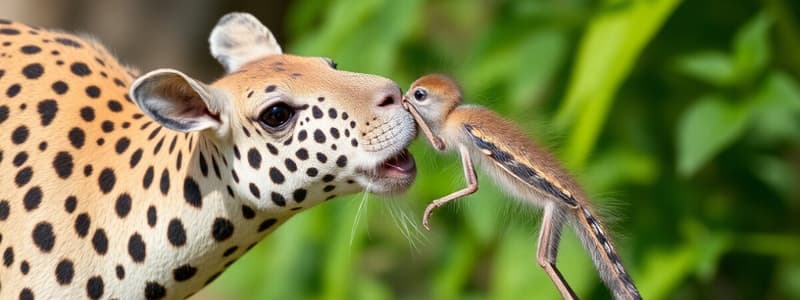Podcast
Questions and Answers
What is the study of the evolutionary development of animal behavior as a result of ecological pressure called?
What is the study of the evolutionary development of animal behavior as a result of ecological pressure called?
- Social Darwinism
- Instinctual Biology
- Genetic Engineering
- Behavioral Ecology (correct)
Which of the following describes an evolutionarily stable strategy (ESS)?
Which of the following describes an evolutionarily stable strategy (ESS)?
- A learned behavior that promotes individual dominance
- A behavior evolved to benefit the individual, such as a female mantis eating the male after reproducing
- A series of interacting _instinctual_ behaviors that develops unstable social relations
- A series of interacting social behaviors that develops stable social relations (correct)
What is the primary reason lions exhibit territorial behavior?
What is the primary reason lions exhibit territorial behavior?
- To engage in social bonding with their pride
- To mark their territory for mating purposes
- To protect their food supply from being depleted by other predators (correct)
- To establish dominance over other lion prides
What does the act of male elk fighting each other to show strength indicate to potential mates?
What does the act of male elk fighting each other to show strength indicate to potential mates?
In the context of evolved mating behaviors, what does gift-giving in bird mating rituals primarily indicate?
In the context of evolved mating behaviors, what does gift-giving in bird mating rituals primarily indicate?
What is the primary benefit of tighter family units in primates regarding child raising?
What is the primary benefit of tighter family units in primates regarding child raising?
What is the main reason for social child raising in humans?
What is the main reason for social child raising in humans?
Which of the following is an example of an instinctual behavior?
Which of the following is an example of an instinctual behavior?
The qualities that species find most attractive in a mate generally indicate what?
The qualities that species find most attractive in a mate generally indicate what?
What does territorial behavior indicate about the resources in an ecosystem?
What does territorial behavior indicate about the resources in an ecosystem?
Flashcards
Behavioral ecology
Behavioral ecology
The study of the evolutionary development of animal behavior as a result of ecological pressure.
Evolutionarily Stable Strategy (ESS)
Evolutionarily Stable Strategy (ESS)
A series of interacting social behaviors that develops stable social relations.
Territorial behavior
Territorial behavior
Behaviors evolved to protect resources from threats.
Mating
Mating
Signup and view all the flashcards
Child raising (Evolved behavior)
Child raising (Evolved behavior)
Signup and view all the flashcards
Study Notes
- Behavioral ecology studies how ecological pressures lead to the evolution of animal behaviors.
- Instinctual behaviors are inherited and often adapted due to external factors.
Social Behaviors
- Evolved behaviors can benefit individuals directly or through social group formation.
- An evolutionarily stable strategy (ESS) is a set of interacting social behaviors that creates stable social relations.
- Penguins huddling together in winter is an ESS that improves their chances of survival.
Territorial Behavior
- Territorial behavior evolves in response to limited resources in an ecosystem.
- Lions protect their territory to ensure their food supply isn't depleted by other predators.
- Territorial behavior is an evolved instinct, not a conscious calculation.
Mating
- Mating, involving mate selection and offspring production, is crucial for species survival.
- Species find qualities attractive in mates that indicate a higher chance of survival for offspring.
- Male elk fighting demonstrates strength, indicating offspring could fight off predators.
- Bird mating rituals with gift-giving indicate resourcefulness.
- Females typically select mates while males compete, increasing the chance of offspring survival.
Child Raising
- Many species evolve tighter family units for a better chance at survival through shared child-raising responsibilities.
- Humans have evolved to raise children socially, with influences from various individuals beyond parents.
- Tighter family groups, found in many primates, enable shared responsibilities like childcare, food production, and defense, benefiting the entire group.
Studying That Suits You
Use AI to generate personalized quizzes and flashcards to suit your learning preferences.



